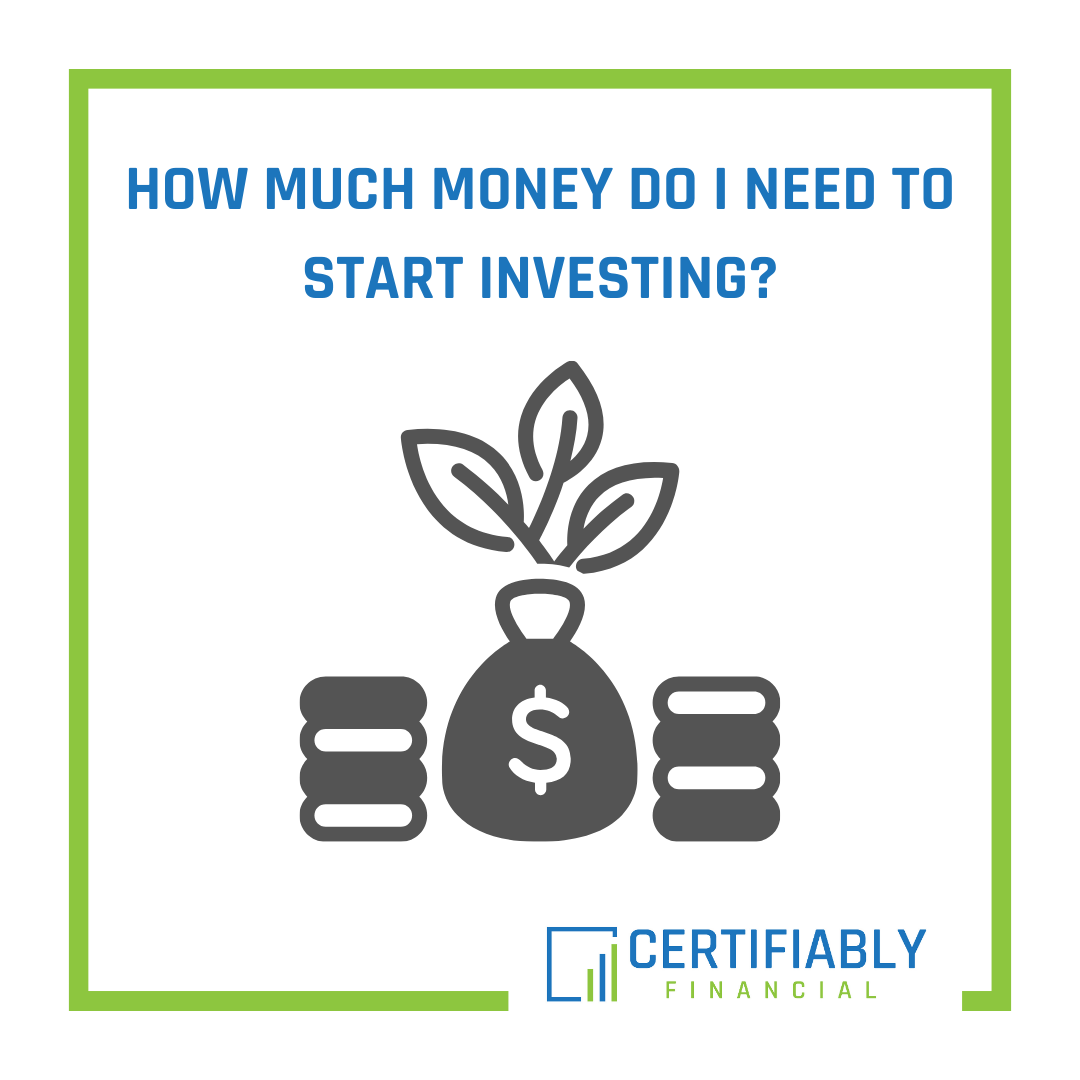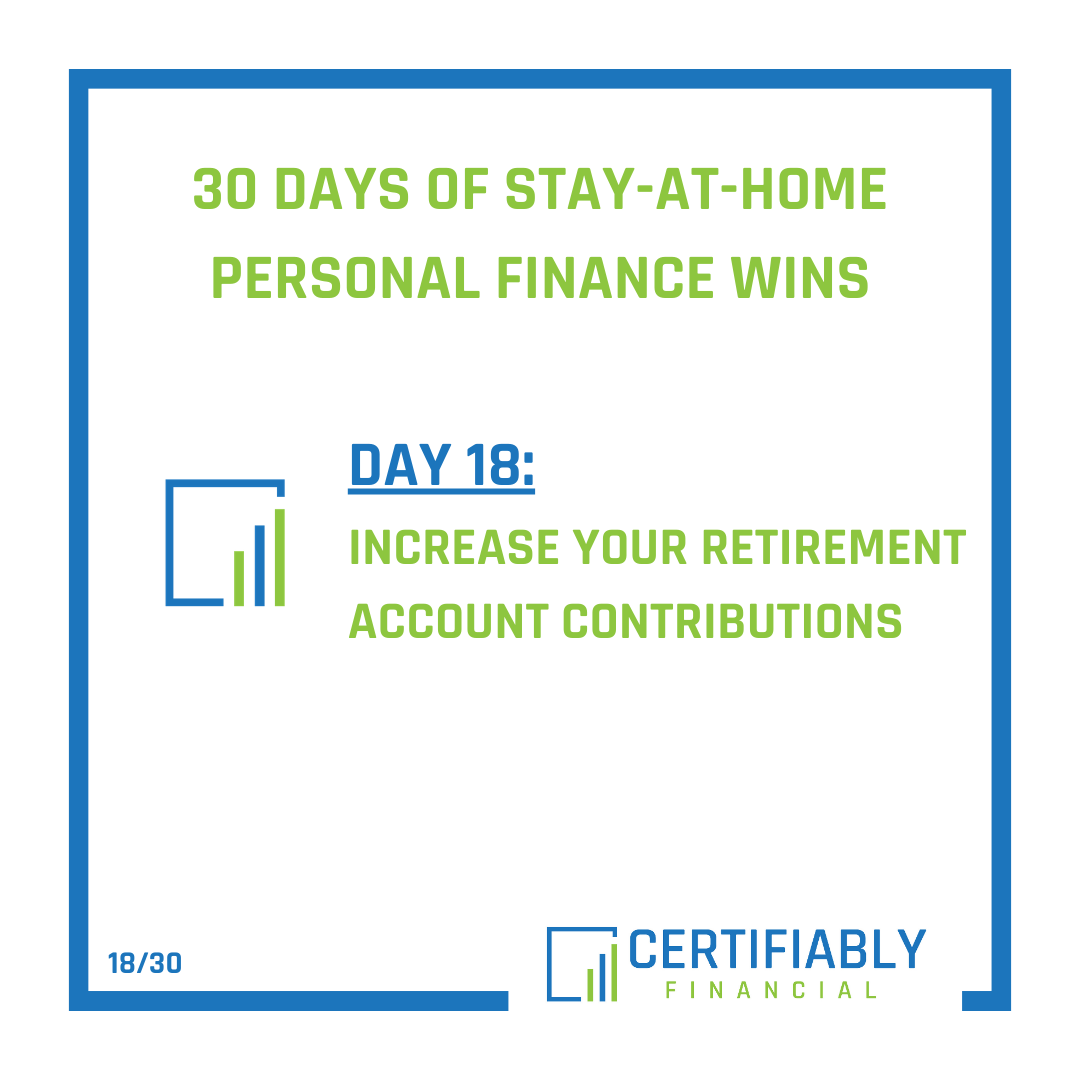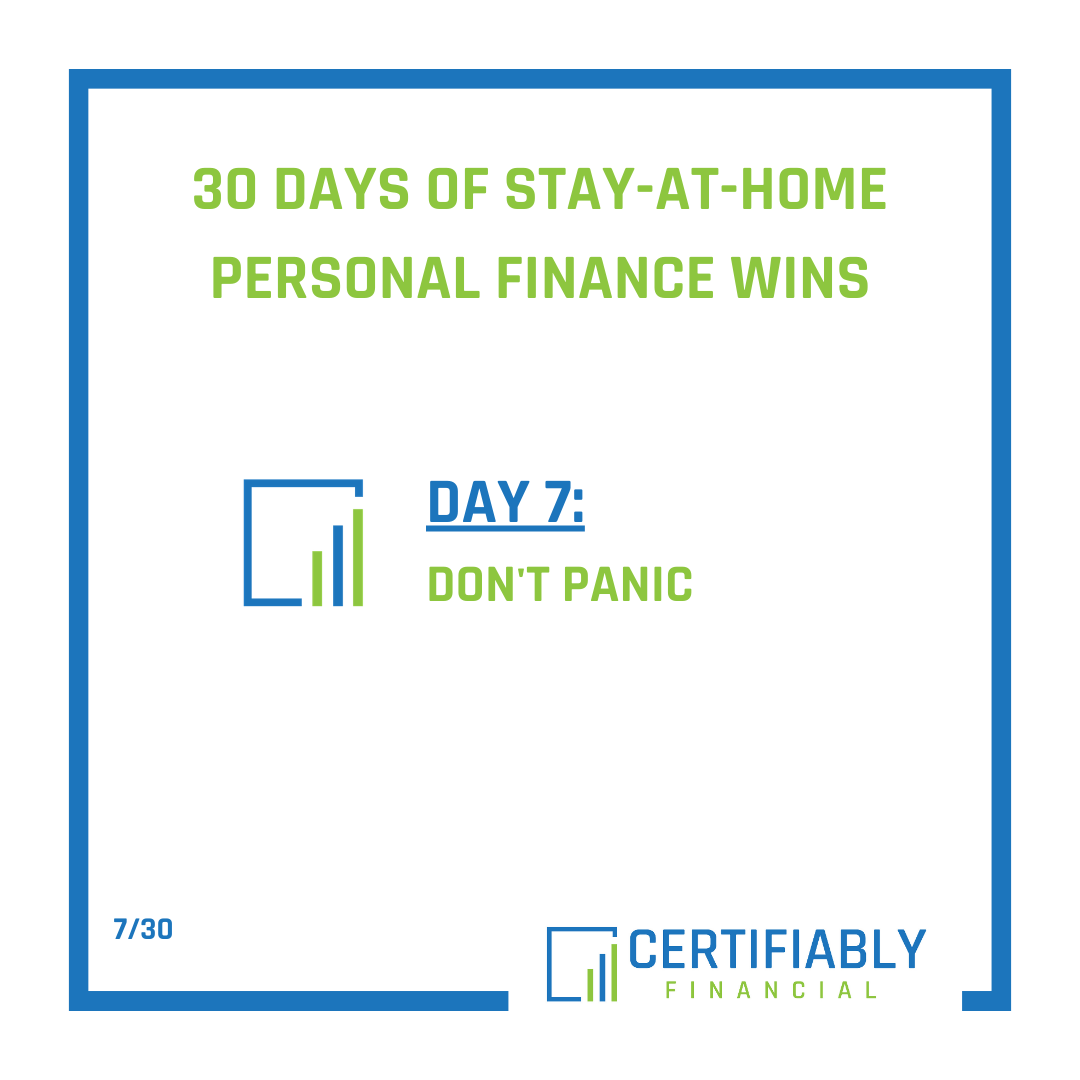I invested my monthly Roth IRA contributions and then contributed an additional $5 so that I could buy one more share of an ETF that I own. At the time that I wrote this that ETF cost $26 per share. That’s a pretty low barrier of entry to something that I consider to be a very worthwhile investment.
Invest
Day 18 Of 30 Days Of Stay-At-Home Personal Finance Wins: Increase Your Retirement Account Contributions
What if you were able to come out of this time of social distancing and economic crisis with a stronger and healthier financial life? What if you looked at this as an opportunity to take a little bit of your extra time each day to work on your finances?
Day 7 Of 30 Days Of Stay-At-Home Personal Finance Wins: Don’t Panic
What if you were able to come out of this time of social distancing and economic crisis with a stronger and healthier financial life? What if you looked at this as an opportunity to take a little bit of your extra time each day to work on your finances?
Rule Of Thumb
There are a lot of financial rules of thumb that are thrown around in articles, on TV, and by so-called personal finance “experts”. What are some of these rules of thumb and what could be wrong with using them for your personal situation?
Savings As A % Of Income
A client recently emailed me letting me know that she got a new job with a significant raise. She wanted help with selecting her employee benefits and said that she was going to contribute enough money to her 401(k) to make sure that she received the employer matching contribution, but she mentioned that she remembered that last year’s financial plan showed that she needed to contribute a higher percentage of her income, although it was at a much lower salary.
IRA
Since I wrote about 401(k)s earlier this week, I figured I’d write about IRAs today. Not everyone has a job that provides an employer-sponsored retirement plan such as a 401(k). When this is the case, an IRA can often be a good alternative to start with to save for retirement.
401(k)
The other day, someone asked me how I feel about 401(k)s. They told me that they weren’t sure about them and that they wanted to invest riskier but they hate not being able to touch it for so many years.
Should I Buy A Home?
7 minute read
I’m a skeptical person and I prefer to research and make decisions for myself rather than do what society tells me I should do. When it comes to purchasing a home and “living the American dream”, I believe that too many allow society to dictate their actions rather than actually taking the time to think through such a significant decision themselves. I prefer to let research and math dictate most of my financial decisions, but this is a subject that most people have a hard time letting go of their emotions to think through.
Most people who own their home love it and the lifestyle that it provides and they simply cannot fathom that owning a home may not be the most financially optimal thing that they could do with their money due to that emotional attachment. Below, you’ll find some of the research that I’ve found both for and against owning a home.
Lifestyle Decision Vs Financial Decision
Buying a home is usually more of a lifestyle decision than a positive financial decision, when you consider all factors involved and the alternatives available to you. There are a lot more factors to consider when evaluating the decision that most people don’t take into consideration, but my research shows me that purchasing a home is not the most optimal thing that I can do with my money in my situation.
However, most people probably wouldn’t take advantage of what’s most optimal anyways and would rather opt for something they feel more comfortable with. I’m not saying that I’ll never buy a home, I will at some point, but I’m trying to do what is the most optimal for my money right now so that I’ll have greater financial flexibility in the future.
Why Buying A Home May Not Be The Best Financial Decision
I wrote about this last year and received a lot of feedback from people trying to tell me that I was wrong. However, most of those people weren’t considering all of the points that I’ve researched and none provided any numerical data to back up their claims. On the other hand, I also received quite a bit of feedback from those who own homes and agreed with the facts that I presented and my point of view but were not willing to rent due to the lifestyle that owning a home provides them.
“You’re throwing money away by renting.”
Alright, maybe I am. But you’re throwing money away by paying closing costs, interest, PMI if you have it, homeowner’s insurance, property taxes, HOA fees, and maintenance and repairs on a home. That’s all money that you’re paying just so that you can make some principal payments towards your mortgage.
Simply comparing the cost of rent to the cost of a mortgage isn’t accurate – you don’t have these additional expenses listed above when renting. Depending on your interest rate, the majority of your mortgage payment may be going towards paying interest for over half of the life of the loan before you ever turn the corner to where the majority of your payment is going towards paying down your principal balance. That’s a lot of money to be “throwing away” that’s not going towards making your personal finances better.
Don’t underestimate home maintenance and repairs. You never know when unexpected expenses will come up that you have to pay for when owning a home – bursting water pipes, a new roof, new water heater, HVAC repairs or replacement, replacing appliances, flooding, termites, mold, renovations, upgrades, routine maintenance etc. It all adds up and may not be as predictable as you’d like to think. If you’re not properly insured some of these could be huge out-of-pocket expenses. Even if you do have the perfect insurance in place, most of these things won’t be covered.
You may say that you’ll build equity by owning a home, but that may not be the best argument given the amount of time that most people own a home. Most people don’t stay in the home for very long and each time you move you have to pay realtor fees to sell your home, closing costs to purchase your new home, and potentially moving fees. Then, you’re going to be starting back over at the beginning of a mortgage where most of your payments are going towards interest.
Additionally, you’re going to be more likely to want to continue to make improvements to your home, especially as your income increases. Some improvements can be very costly while not actually increasing the value of your home. That could be money that you spend and never see again.
“But I can pay more on my mortgage”
True, you can, but the question of whether you should do so or not depends on the interest rate on your mortgage and your expected rate of return by investing that extra money instead. Would you be better off by investing your money at a compounded rate in the market or paying extra towards your mortgage at an amortized rate? As with most things in personal finance, the answer depends and could be different depending on whether you want to take the mathematically optimal approach, the emotionally optimal approach for you, or a hybrid.
“But home prices appreciate.”
Do you know how much home prices appreciate? Historically, in the United States, home prices have appreciated at about the same rate as inflation. In real terms (home price appreciation % minus inflation %), this means that you haven’t made any money through the appreciation of your home. Keep in mind, regional date could be much different and there are places where home appreciation has outpaced inflation.
Even if your home price has outpaced inflation, it doesn’t really do you much good unless you sell your home and get the money out of it or you pay to refinance/pull the equity out of your home. If you’re refinancing to use the equity out of your home, then you’re going to be paying interest again to use that money.
If you took all of those extra expenses that you’d otherwise have to spend to own a home and invested them in the market, which has significantly outperformed the appreciation of home prices historically, then history tells you that you’d end up ahead. The problem with this is that most people aren’t disciplined enough to “invest the rest”.
Depending on how much you plan to use as a down payment on the home, you could be losing out on quite a bit of returns by having that money in cash until you have reach a significant down payment rather than investing it in the market. Even if you were to calculate the rate of appreciation on your home, you’d still need to back out ALL of the money that you’ve put into it, including ongoing repairs and maintenance, to get to an accurate number of how much it has appreciated on a % basis.
“I own my home outright.”
If you’ve been diligent enough to pay off your home and you can say that you own it outright, that’s amazing! You’re in the minority. But, take a minute to think about what that does for you financially. As I mentioned above, in order to have access to the equity in your home you have to either sell it and incur the transaction costs of doing so or you have to use a financial instrument such as a home equity line of credit or a reverse mortgage to have access to that wealth. With a home equity line of credit or a reverse mortgage you’re going to be limited to the amount of equity that the financial institution will allow you to use.
You Aren’t Prepared
Most people don’t have a properly funded emergency fund in place or a significant down payment to put down on a home purchase. You want to have a cash reserve of 3-6 months of expenses in addition to a down payment before considering purchasing a home. You also want to make sure that you’re purchasing a home that you can actually afford and that you’re ready for the extra responsibility and potential unforeseen expenses that come along with homeownership.
Concentration Risk
As a financial planner, I’m expected to preach diversification to my clients. If someone has all of their money in one stock and something happens to the company, there’s the potential for the client to lose all of their wealth. Many people are in a similar situation with their home in that it holds the majority of their wealth.
If a home is not properly insured, or a homeowner doesn’t have a cash reserve in place, a disaster could mean a total, or near total, loss of wealth. Yes, the value of the land will still be there, but the home price for most people is probably worth more than the land alone. Many people live in a situation where their hopes for a positive financial future would be gone if their home were destroyed. Even if your home weren’t destroyed, you probably only own a house in one place. If that place experienced a significant housing market decline, your net worth would significantly decline along with it. It’s important to diversify your net worth outside of your home.
The Argument For Buying A Home
There are arguments for buying a home, but I don’t believe that there are many financially viable arguments for doing so in most situations. (Notice I said “most”.) One such point that could be made is that most people wouldn’t follow the plan I’ve set out above of investing the money that they would otherwise have to pay towards additional expenses to own and maintain a home.
Forced Savings
Yes, paying a mortgage is almost like forced savings, but remember that the majority of your payment is likely going towards interest on a 30-year mortgage for quite a while. Additionally, when most of your net worth is tied up in the equity in your home you can’t use it without selling or using another financial instrument that is going to cost you money.
Emotional Investment
Buying a home is a much better emotional investment for most people than it is a financial investment, given the available alternatives. Some people love completing house projects, working in the yard, and maintaining a home and making improvements without having to ask permission. They enjoy being able to come home from work to a house that they love and that they don’t have to follow rules in set by a landlord. I believe that the emotional aspect of owning a home is the most viable argument and one that I would concede with much more readily than a financial argument for doing so.
First Time Home Buying Process
Not everyone is willing to live the renting lifestyle, even in a standalone home, and I understand that. Some people want a place that they can call their own and that they can personalize without having to answer to anyone else. I’ve asked one of my friends who has recently purchased a home to write a post about his experience of buying his first home. Be on the lookout for his article at the end of this week.
Additional home purchase consideration resources:
- Episode #100: Elroy Dimson, “High Valuations Don’t Necessarily Mean That We’re Going to See Asset Prices Collapse” – Meb Faber, Meb Faber Research Stock Market & Investing Blog
- I’m a financial planner — here’s why I won’t buy a home – Eric Roberge, Business Insider
- Why your home is a worse investment than you think – Ken Fisher, USA Today
- I hear you, but your home is still a lousy investment – Ken Fisher, USA Today
- Point/Counterpoint on Real Estate as an Investment Option – Ben Carlson, A Wealth of Common Sense
- The true cost of homeownership is higher than you think – Wealthy Nickel
- How Much House Equity Are You REALLY Building? – Eric Roberge, Beyond Your Hammock
Details Matter
4 minute read
I’m passionate about financial planning because it’s a profession that allows me to put my skills to work helping others in an area of life that most people can use help. Although I know I stray from this line of thought often, I was raised to always try to put others first and think of them before considering my own wants and needs. Unfortunately, it seems that there are many others in the financial services industry who consider their own wants and needs before thinking of their clients.
Don’t Be Left In The Dark
The reason I’m writing this is due to two separate situations that I’ve been made aware of recently. One of the situations is something that someone I work with discovered when combing through a new client’s information from their previous financial advisor and one is something that a friend found when exploring a new client’s financial information from a former advisor. Both show how easy it is for investors to be left in the dark if they’re not working with someone trustworthy.
The first situation that I mentioned above is something that my boss found when reviewing a new client’s Indiana CollegeChoice 529 Savings Plans that were setup for them by a financial advisor who works for a financial services firm with a household name. It’s great that the clients have these plans in place and are already saving for college for their young children, but this was an “Advisor” plan rather than a “Direct” plan. This means that the financial advisor set up the plan for the clients and managed the investments within the plan rather than the client setting up the plan themselves and choosing the investments.
The clients were being charged 4.75% on every single deposit they made into the accounts, and that was after receiving a discount from the 5.5% othey were being charged prior to account hitting a certain balance. What a deal.
That’s insane. They had no idea.
This is something that we don’t even charge for at the company that I work at because there isn’t very much value that we can add to managing 529s. We help clients setup a “Direct” account and tell them which investment to choose. There’s not a whole lot more to a 529 than that although the example above seems to indicate that there are other financial services firms that think so.
Free Account
The second situation is one that one of my friends came across when reviewing information for a prospective client. The client’s current financial advisor told her that her account is free with no annual fee. (Remember our discussion about free above?)
Notice how the message was framed to her. “The account is free with no annual fee.”
Technically, she isn’t paying an annual fee for the account. What she is paying is the up to 5.75% up-front commission on all of the mutual funds she purchases within the account in addition to the ongoing expense ratios on the mutual funds, one of which is 5.5%. Most are at least 1.2%.
I can imagine where most of the money being made off of that “free” account is going.
Know Who You’re Working With
Just because your friend or family member got a new job as a financial advisor where they’re required to sell products and they start with pitching them to their friends and family doesn’t mean that you have to, or should, work with them. Isn’t it kind of scary how easy it is for someone with no financial experience to get a position like that which could have significance long-term consequences on those they’re selling to?
I’m very fortunate to have a degree in financial planning and to have learned about all aspects of the financial services industry. Most who work within the industry haven’t been fortunate enough to experience this type of education and be exposed to all the different sides of the industry and how each is compensated.
I believe that some people who are selling these awful financial products to others genuinely believe that they’re doing a great job helping them and that they’re doing something good for the client. I think a lot of financial salespeople don’t even know that there’s another side of the industry and that there’s an option to always work as a fiduciary in the client’s best interest. They’ve simply been told that they have an opportunity for a solid job with high income potential and that’s the extent of their knowledge on the industry.
Unfortunately, there are those who know about all sides of the industry and know that there are better options for their clients but are more motivated by continuing to line their own pockets. Oftentimes people who works at these types of firms are simply salespeople who passed basic level securities exams to keep them out of prison, not educate them on financial planning. Many have no background or previous experience in finance or financial planning. It may be harsh, but it’s true.
Eliminate Conflicts of Interest
Stories like those above demonstrate exactly why I chose to work at a fee-only, independent RIA and not sell products or be paid on commission. Commission-based advisors inherently operate under a conflict of interest. No matter what product is best for your situation, they’re incentivized to sell you the one that makes them the most money, pays their mortgage, and feeds their family.
Maybe now you’re even more paranoid to work with a financial planner because of these stories. Or (hopefully) you’re more motivated to audit your current financial professional’s recommendations and the things that you’ve implemented in your own financial life. Either way, here are some things that you can do to help make sure that you’re working with someone who is obligated to always work in your best interest. I’ll repeat a few of them below.
- Work with a CFP professional
- Work with a NAPFA-Registered Financial Advisor
- Ask them if they act as a fiduciary for you at all times
Start Simple
3 minute read
Most people have never received personal finance education and have no idea where they should start to begin creating a better life for themselves. The great thing is that you don’t have to fix everything all at once. Starting with anything and progressing incrementally should be the goal. Hopefully this post helps you figure out where you are today and what the next steps are that you can take to begin making progress in your financial life, which hopefully spills over into all other areas of your life as well.
Get Organized
Getting organized is the most basic, but also potentially most daunting task for some. Depending on how in-tune you are with your financial life (and how organized you are in general), this could be a time-consuming project or could just be some tidying up.
I’m very organized in all aspects of my life because I find that it makes things easier for me, helps me to be efficient and accomplish my goals, and relieves stress. Organizing your financial life can do the same things for you and can be your first step towards financial freedom. I’ve already written about this before, so I’ll list the three basic steps that you can take to help you start easing some stress and become more aware of your current personal financial situation:
- Figure out where you’re going to store your documents and passwords
- Gather your login information and important financial documents
- Evaluate your financial situation and set goals
With your financial life organized you’ll be able to evaluate what your current financial situation looks like and where there’s room for progress to make sure that you reach your goals. You can click here to see a list of things that you may want to gather to help you understand where you are and figure out what you need to do to get where you want to be.
Evaluate The Foundation
Once you’ve got your financial life organized, it’s time to evaluate where you are. Three of the most basic, but also most vital things that you can do to create a solid financial foundation are to establish an adequate emergency fund, make sure that you have the proper insurance coverages in place, and pay yourself first by saving for retirement and other goals before spending any of your income. If you have a significant amount of debt that you’re paying off, then you can evaluate whether you should save more or pay it off more quickly.
The process is much simpler than many make it out to be and there’s no need to complicate it more than necessary. Consistency is the hardest part for many in making changes to their personal finances. When something pushes you off track it’s best to get right back to it rather than let it derail you completely. It takes a while to form a habit, so you have to be diligent about focusing on the fundamentals and changing your actions before things begin to come naturally to you. Changing the course of your personal finances, and your life, is worth it.
Do the easy things that will provide you with the most value and bang for your buck and then you can get more complex from there.
Take the Next Step
No matter where you are in the process, do something today to take the next step towards bettering your financial life. Whether you need to get organized, increase your savings by 1%, or you’re ready to seek out a financial planner, progress is progress. Too often people wait until something significant happens in their life to consider their personal finances and the changes that need to be made. Be proactive and make sure that you’re on the right path before a life event forces you to make changes that you didn’t want to.










